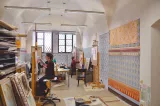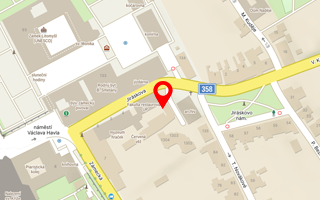Follow-up Master's degree programme
List of Courses | Faculty of Restoration
Basic aim of the study programme
Two decades ago, the basic idea that the new educational institute should be built on multidisciplinary principles was set out and developed.
The idea of systematically educating students in team cooperation and respect towards the artefact under restoration was declared. Furthermore, such respect should be shown towards similar articles which, although not artistically superior, document the culture of their age, especially in urban and rural environments, and therefore carry information of the same weight as the finest works of art. The focus is thus on art culture in its broadest sense, not merely the finest works of art. The conservation and restoration of works of art and other material evidence of culture is interdisciplinary and, therefore, an extremely complex process. This field of activity is not only affected by technical issues but also by moral and philosophical issues, as well as issues concerning interpersonal relationships. Professional groups meeting in this context hail from various specialist and academic backgrounds, differing greatly in thinking, professional conduct and, to a certain extent, in their perception of values.
Conservation and restoration cannot be undertaken without team cooperation. If restoration is to develop on a genuinely rational basis, the widest cooperation between restorers-conservators, naturalists and historians is a necessity. All three professions enter the restoration process from various points of view, apply various operating processes, and achieve varying professional and scientific outcomes. Therefore, it is necessary for them to learn to ask each other intelligible, clearly formulated questions and, consequently, to answer them.
A crucial methodological premise is that one of the primary tasks in the care of monuments, museums, libraries and archive services is forming a prevention system, thus reducing the need for a restoration or conservation intervention to a minimum. Such an intervention is a powerful method of protection or salvage and is always a specific form of interpretation. An essential part of the study programme is documentation. Inherently, documentation serves as a source of information for the future approach to the restored piece of art but is also an important source of information for art history or other interpretations of the object. One of the outcomes of restoration or conservation should be thorough and comprehensive documentation containing the formulation of new discoveries of art historical value as well as relevant scientific analyses, serving both to determine the optimal operational process and to gain new information for the development of general knowledge. Discoveries, seemingly unimportant at first, can be significant in the future and therefore, it is ethically imperative to record them.
Students Affairs Department
Jitka Korábová, e-mail: jitka.korabova@upce.cz
Petra Pokorná, e-mail: petra.pokorna@upce.cz
Office Hours: Monday–Friday 9:30–11:30 / 12:30–14:00
International office
Studying in a foreign country is a big step in students' lives. We are aware of that and, therefore, we have set up a support system named the Office of International Affairs, which may help students make such a step.
The International Office supports incoming international students with various practical matters and official procedures, such as application and registration procedures, the choice of courses and timetables, accommodation costs and social life. All the procedures and information are regularly updated on the university web page: https://www.upce.cz/en/study
• Application forms for incoming students
• ECTS Course Catalogue (courses of the FR UPce to be consulted with the faculty coordinator)
• ECTS forms for Erasmus students
• Accommodation forms
Everyone interested in studying at the Faculty of Restoration shall contact the faculty mobility coordinator: mobility.fr@upce.cz
Looking for research at the University of Pardubice: https://www.upce.cz/en/rad/universityresearch.html

